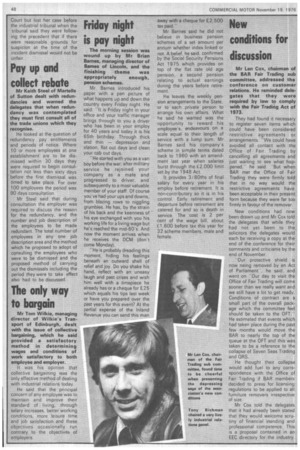Friday night is pay night
Page 50

If you've noticed an error in this article please click here to report it so we can fix it.
The morning session was wound up by Mr Brian Barnes, managing director of Barnes of Lincoln, and the finishing theme was appropriately enough, pension schemes.
Mr Barnes introduced his paper with a pen picture of what happens up and down the country every Friday night. He said: "It is Friday night in your office and your traffic manager brings through to you a driver who has been in your employ for 40 years and today it is his 65th birthday. Through thick and thin — depression and elation, flat out days and clean your cab out days.
"He started with you as a van boy before the war; after military service he rejoined your company as a mate and • .progressed to driver, and :subsequently to a most valuable member of your staff Of course you've had your ups and downs, from blazing rows to niggling grumbles. He has, by the strain of his back and the keenness of his eye exchanged with you his working life for a living wage but he's reached the mid-60's. And now the moment arrives when he receives the DCM (don't come Monday).
"He is probably dreading this moment, hiding his feelings beneath an outward shell of relief and joy. Do you shake his hand, reflect with an uneasy laugh and past crises and wish him well with a timepiece he already has or a cheque for £25 which equals his tips last week or have you prepared over the past years for this event? At the partial expense of' the Inland Revenue you can send this man away with a cheque for £2,500 tax paid.'
Mr Barnes said he did not believe in business pension schemes of a set amount per annum whether index linked or not_ A belief, he said, confirmed by the Social Security Pensions Act 1975 which provides on top of the flat rate old age pension, a second pension relating to actual earnings during the years before retirement.
He leaves the weekly pension arrangements to the State, or to each private person to arrange his own affairs What he said he wanted was the opportunity to reward his employee's, endeavours on a scale equal to their length of service with a lump sum. Mr Barnes said his company's scheme in simple, terms dated back to 1960 with an amendment last year when salaries burst through the I:2.000 limit set by the 1948 Act.
It provides 3i8Oths of final salary for every year in his employ before retirement. It is non-contributory so it is in his control Early retirement and departure before retirement are catered for and so is death in service. The cost is 2 per cent of the wage bill, about £1,600 before tax this year for 32 scheme members, male and female.




































































































